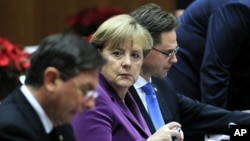Stock markets and the value the euro currency rose after most members of the European Union agreed to a new deal Friday, increasing their economic ties to save the struggling eurozone. But reaction is mixed about the agreement, cobbled together after marathon talks among European leaders in Brussels.
European Central Bank chief Mario Draghi reacted positively to the agreement for stronger fiscal ties and better control over government budgets.
"It's a very good outcome for the euro area, very good. It's quite close to a good fiscal compact, and certainly it's going to be the basis for a much more disciplined economic policy for euro-area members, and certainly it's going to be helpful in the present situation," Draghi said.
Twenty-three of the EU's 27 members have agreed to the pact, championed by economic heavyweights France and Germany to make sure Europe's sovereign debt and banking crisis doesn't happen again. That includes all 17 members of the embattled eurozone. But at a final press conference on Friday, European Union president Herman von Rumpoy said three more countries are considering joining - which would leave Britain as the single holdout.
"Our preference went to a full-fledged treaty change with the 27, changing the treaties of the Eurpean Union. We tried it, but because there was not a unanimous decision, we have to take another decision," he said.
German Chancellor Angela Merkel hailed the deal as a success. She said those who opted to create a new fiscal union chose a future of more solidarity and economic coherence which will make the euro currency more secure.
EU members adhering to the new treaty must commit to keeping their deficits below 0.5 percent of their economic output - or risk sanctions. The pact is expected to be signed by March. European leaders also agreed on other measures to stop the eurozone crisis from spreading - like giving the International Monetary Fund another $260 billion to bolster financial firewalls.
But Simon Tilford, chief economist of the London-based Center for European Reform, says the new treaty does nothing to resolve to resolve Europe's debt crisis.
"The problem is that fiscal austerity will not solve this crisis - at least not alone," Tilford said. "Fiscal austerity has in many ways been part of the crisis. Enforcing unending austerity on the countries in the periphery has already made their predicaments much worse and threatens to make a bad situation in Spain and Italy already worse than it currently is."
Other analysts fear the deal weakens European unity - with one group of countries part of the new pact and another out of it. British Prime Minister David Cameron defended his decision to reject the treaty - and offered another vision of Europe.
"We're not in the euro, and I'm glad we're not in the euro," Cameron said. "So i think the idea of Europe being more of a network - you choose those organizations you join, you choose those organizations you don't join - is actually a way in which Britain can get what we want and what we need in Europe."
Analyst Tilford says whether Britain and others will be weaker for opting out of the fiscal pact depends on what happens to the eurozone.
"If the eurozone does master this crisis and holds together, we're likely to see increased integration within participating countries within the eurozone, and Britain will become progressively marginalized within the EU," Tilford said.
But if the eurozone crisis drags on and the euro area fractures, he says, that's another story. And Tilford sees nothing in the new pact EU leaders agreed on that makes him optimistic about the euro's future.
EU Divided on New Deal to Save Eurozone
- By Lisa Bryant




